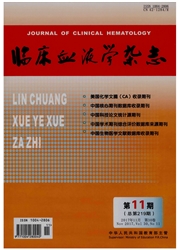

 中文摘要:
中文摘要:
目的:分析需手术治疗的初诊食管癌患者围手术期间,除了术中出血之外,其他与输注异体红细胞相关的影响因素。方法:回顾性收集178例经手术治疗的食管癌患者的临床资料及输注异体红细胞情况,并对输血相关因素进行单因素和多因素Logistic回归分析。结果:178例食管癌患者中有23例输注1U及以上悬浮红细胞,输血率12.9%。单因素Logistic回归分析结果提示年龄、术前Hb浓度、术前白蛋白浓度、肿瘤TNM分期,是患者围手术期是否输注异体红细胞的影响因素(P〈0.05)。多因素Logistic回归分析提示性别、体重指数、白细胞数量、食管癌长度、位置、手术方式、术前肺功能情况、患者血型、凝血常规情况对成分输血无显著影响(P〉0.05)。结论:年龄、术前Hb浓度、术后肿瘤TNM分期,尤其是术前低白蛋白血症,是影响患者是否需要输注红细胞的影响因素。
 英文摘要:
英文摘要:
Objective:To investigate the clinical factors which are related to allogeneic red blood cell transfusion (ARBCT) in newly-diagnosed esophageal cancer patients during peri-operational period. Method.. This is a retro- spective cohort study including 178 newly-diagnosed esophageal cancer patients. Firstly, we screened independent risk factors associated with peri-operational ARBCT by univariate Logistic regression analysis, then, the candidate factors were further verified by multivariate Logistic regression. Result: ARBCT rate in this corhort was 12.90/00. Age, peri-operational hemoglobin level, peri-operational hypoalbuminemia and tumor staging were candidate risk factors for peri-operational ARBCT by univariate Logistic regression analysis. In subsequent multivariate Logistic analysis, hypoalbuminemia was showed to be the only rsik factor associated with peri-operational ARBCT. Conclu- sion: To the best of our knowledge, other than age, peri operational hemoglobin level and tumor staging, it's the first study to show that peri-operational hypoalbuminemia might be the risk factor associated with peri-operational ARBCT.
 同期刊论文项目
同期刊论文项目
 同项目期刊论文
同项目期刊论文
 Actived NF-KB in bone marrow mesenchymal stem cells from systemic lupus erythematosus patients inhib
Actived NF-KB in bone marrow mesenchymal stem cells from systemic lupus erythematosus patients inhib In vitro migratory aberrancies of mesenchymal stem cells derived from multiple myeloma patients only
In vitro migratory aberrancies of mesenchymal stem cells derived from multiple myeloma patients only 期刊信息
期刊信息
